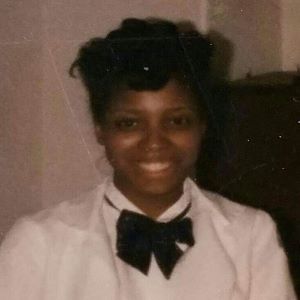
Cassandra Webb
OCCUPATIONAL THERAPY
Graduated in 1984
Q: Why did you choose Wayne State University?
A: As a resident of Detroit, and a working student, I chose to attend Wayne State University because of its location, affordable tuition, and its variety of academic programs.
Q: What inspired you to pursue Occupational Therapy?

A: My desire to become an occupational therapist was quite personal. My younger brother, who was diagnosed with cerebral palsy as a child, received occupational therapy. I can remember accompanying him to therapy sessions with my mom at the old Children's Hospital on Beaubien Street. I recognized the benefits of OT through play, by watching him develop gross motor skills that were necessary to ride his red tricycle!
Q: Who was your most memorable Professor?
A: Professor Libbie Boles, a mental health OT instructor, was my most memorable professor. She was gentle and approachable and was always willing to listen to and advise students on their concerns no matter how silly these appeared to be.
Q: What was your most challenging class?
A: My most challenging class was Dr. Tracy's anatomy class which required sheer memorization and intense study. I spent many nights in the Anatomy Lab at Shapero Hall, and even cried a few tears on those cadavers! Surprisingly, 40+ years later, I still have my Gray's Anatomy Book and notes!
Q: Where was your favorite place to study?
A: Favorite places to study include: the cadaver lab at Shapero Hall, the Student Center Building, State Hall, Purdy-Kresge Library, and the Science Library on main campus. I also ate and studied at McDonald’s which is now the location of The Welcome Center!
Q: Did you have a favorite hangout on campus?
A: Wayne State's campus and surrounding businesses look quite different than they did in the early eighties! The lower level of the Student Center Building was a favorite hangout spot. Also the Circa 1980 Saloon on Cass Ave. near main campus was a popular hangout spot.
Q: Share some reflections about your time at Wayne State:
A: Time spent at Wayne State is full of mostly fond memories. As a proud WSU Warrior (we were Tartars then), I am thankful for the years spent at WSU. Because of WSU, I have had a fulfilling career for almost 40 years, and a productive life!!!
Q: In your opinion, what is one of the biggest changes that has occurred in your profession since graduating?
A: One of the biggest changes in OT since graduating is that OT has become a more specialized profession. When I was in college, an entry level OT was trained as a generalist, and only needed a bachelor's degree to graduate. Today, OTs must pursue master's degrees and even a doctorate, plus additional certifications to practice at the entry level.
Q: Share a career highlight or summary:
A: One of my career highlights is becoming the first OT at the Detroit VAMC to be assigned to work with homeless veterans. This assignment has been a challenging but a very rewarding career highlight, and an opportunity to utilize education, creativity, critical thinking skills and resources that were acquired from the WSU OT program. WSU and OT have taught me how to assist marginalized groups (ie. individual’s w/ a history of homelessness) with achieving their greatest potential.
An occupational therapist helps patients engage in everyday activities that are important to them, using a variety of productive and creative activities. Learn more about the WSU Applebaum Occupational Therapy program by attending a college information meeting, held for prospective students at 6 p.m. on the first Tuesday of each month.
An anchor in urban health care
The Eugene Applebaum College of Pharmacy and Health Sciences is built on more than 100 years of tradition and innovation in the heart of Detroit. We have grown deep roots in our city, harnessing its powerhouse hospital systems and community service organizations as vibrant, real-world training grounds for students, with an ongoing focus on social justice in health care. And our research at all levels – from undergraduates to veteran faculty members – translates into creative solutions for healthier communities.
Wayne State University is a premier urban research institution offering approximately 350 academic programs through 13 schools and colleges to nearly 24,000 students.